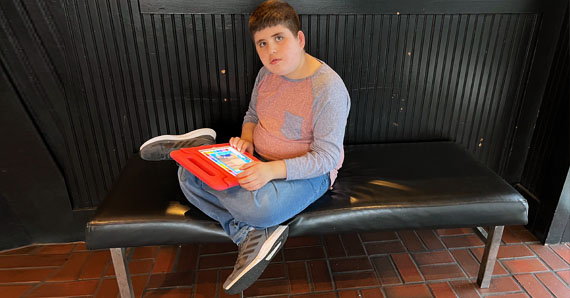It’s only an hour or two, but I feel like I’m packing for a weeklong battle. Before I even get my non-verbal child buckled into the car for, what should be, a routine outing, my backpack overrunneth with necessities. Like a rucksack of survival, my knapsack is filled with Lucas-centric items.
There are electronic toys, changes of clothes, toiletries, and snacks. Oh, the snacks. From bags of Booty to juice boxes, he can’t have enough snacks on standby. He’s the only person I have ever known who brings snacks to the restaurant.
Learning the need for them was a lesson in special needs parenting. Sitting at an Italian restaurant with my round little eleven-year-old, I figured bread would be enough to keep him nourished in the brief waiting period. I figured wrong.

Lucas rolled through the rolls like a vacuum. Before the waiter had even walked away, the basket was nothing but crumbs and butter packets. My son, with one hand on my shoulder, tapped his own chest while making eye contact. It’s his way of saying, “Me? Food? Where?”
Just hold on, buddy. It’s coming. We need to wait.
I held up my hand, which we accept as the signal of “wait”. But still, he persisted. His hand was raised to his mouth now as if to say, “Yeah. Food? Where?”
Buddy. Wait. You just ate. Just wait.
And that’s when the baby elephant came out to play. My son threw his back and let out his sustained whine of unhappiness. This went on indefinitely while the slow-as-hell service molasses’d our meal over to us. It was hellacious. Hence, restaurant snacks became the norm.
Typically, these posts are about the similarities between raising a neurotypical child and one like my boy. This isn’t one of those posts. There has been a slew of outside-the-house adventures that caused a strain. Restaurants, however, take the cake.
You know what else takes the cake? Lucas. That’s why he’s usually wedged against the wall in a booth while I block him in like a hockey goalie. Sure, he can have his own chair or a spot at the open end. That, however, will also lead to a fistfight in Applebees.
While it hasn’t happened with me, I have heard horror stories about my normally docile little fella springing up and lunging for the food on someone else’s table. How awful is that?
Think about the reactions it could elicit.
Think about the words or things that could be hurled.
Think of being embarrassed for your child and offended by all the people staring at him.
Think of being apologetic to the point of too much.
Now think about why I need that kid scootched into the seat against the booth wall. Without that placement, even on his best days, I would spend my meal worrying about a potential brawl over a plate of potato skins.
You could say that restaurants are a “trigger” for him. I’ve had to stop him from eating food off the floor or from other plates at our table. He’s begged me for my meal once he has shoveled his into his face. He’s knocked over glasses at places that, inexplicable, don’t have kid’s cups. He’s sneezed on waitresses and fallen asleep the moment we sat down. He’s starving and all social norms are thrown out the window. Going to a restaurant with my boy is like going to a restaurant with someone who just escaped a kidnapper’s basement after three years.
That said, I took Lucas to a restaurant yesterday…and he was great.

To someone else, it seemed like nothing. He didn’t set the table or say grace. He simply sat, played on his device, and ate. There was no angelic behavior, but there was no fussing. He was fine. For us, fine is great and that’s the standard we strive for.
For new parents in my position, “fine” isn’t always fine. Whether it’s eating at a diner or life in general, we want our kids to be the best they can be. When your child is first showing signs of delay, autism, or a different behavior, it’s natural to wring your hands at every misstep.
My son doesn’t use a fork or drink from a typical glass. If that was required for me to think he had a good meal out, then I would never think he had a good meal out. His bar is different for me. I know what he can do and I know what he can’t (yet). Holding him to an unattainable standard just ensures that I will always be unhappy. Recognizing who he is, how far we’ve come, and how much he’s trying will ensure that we always move forward.
Knowing what your kid is capable of is half the battle. Accepting that those things outside his reach won’t happen tomorrow is the other. Remember your goals and what you want your child to do. Hope for the best, prepare for the worst, and you’ll never find yourself surprised by the outcome.
Well, that’s not entirely true. Sometimes you might be surprised. Whether that surprise is positive or negative all depends on how the wind blows that morning. Either way, it’s about making progress.
My boy is making progress. If that means I have to let him have a snack-size bag of Cheese-Itz while waiting for chicken fingers, so be it. We’re in this together, kid. Now scoot into the booth.
READ NEXT:
DIVORCED DAD ON “STAYING TOGETHER FOR THE KIDS”




You must be logged in to post a comment.